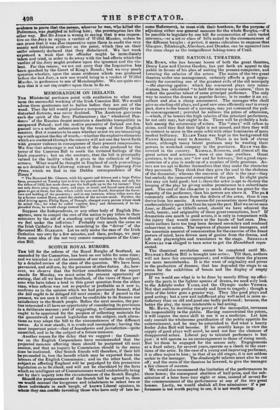"IMPERATIVE" REASONING.
SIR JOHN CAMPBELL maintains that the evidence given be- fore the Coroner's Inquest on CULL'S', "so far from Justifying a verdict of Justifiable Homicide, made it imperative on the Jury to return a verdict of W.lful Murder." Now, certainly, there was no Widellee- to prove thst-the person, whoever he was, who lined the Policeman, was justified in killing him; the presumption lies the other way. But Sir JOHN is wrong in saying that it was impera- tive on the Jury to reorn a verdict of Wilful Murder, unless he can prove that it was also imperative upon them to credit the very aunty and dubious evidence on the point, which they on their oaths solemnly declared that they disbelieved. We last week expressed a wish that the offender might be immediately taken and tried, in order to do away with the bad effects which the Verdict of the Jury might produce upon the ignorant and the vio- lent. For this reason, we are not sorry that the Inquisition has been quashed by the Court of King's Bench; but we very much question whether, upon the same evidence which was produced before the last Jury, a new one would bring in a verdict of Wilful Murder, in preference to one of Manslaughter. We are quite cer- tain that it is not imi:erative upon them to do so.

















 Previous page
Previous page